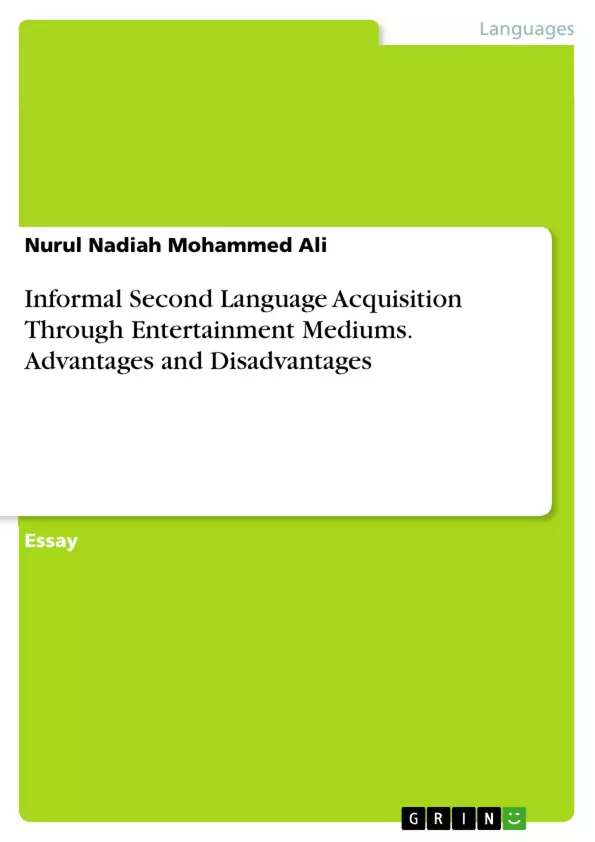This essay seeks to determine the advantages and disadvantages of informal second language acquisition through entertainment mediums. The purpose of this essay is to explore the effectiveness of the entertainment medium as a platform for second language acquisition.
It was anticipated that the knowledge generated from this deconstruction would afford new perspectives on the process of second language acquisition for today’s generation. The essay concludes that informal second language acquisition through the entertainment medium provides an effective platform for the language learner although some disadvantages still persist in this system.
Table of Contents
- INTRODUCTION TO SECOND LANGUAGE ACQUISITION
- Bilingualism and Second Language Acquisition
- Informal Second Language Acquisition Through Entertainment Medium
- DISADVANTAGES OF INFORMAL SECOND LANGUAGE ACQUISITION THROUGH ENTERTAINMENT MEDIUMS
- Informal Second Language Acquisition Through Social Media Platforms Leads to The Adoption of Non-Standard English Grammar
- Informal Second Language Acquisition Leads to The Acquisition of Dialects Rather Than An Official Language
- ADVANTAGES OF SECOND LANGUAGE ACQUISITION THROUGH ENTERTAINMENT MEDIUMS
- Informal Second Language Acquisition through Entertainment Enhances Learners' Memories of The Target Language
- Informal Second Language Acquisition through Music Expose Learners to Proper Pronunciation of Target Language
- Informal Second Language Acquisition through TV Shows Familiarise Learners to Cross-Cultural Communication of Target Language
- Informal Second Language Acquisition through Facebook Increases Learners' Confidence to Practice the Target Language
- CONCLUSION
Objectives and Key Themes
This study aims to examine the advantages and disadvantages of informal second language acquisition through entertainment mediums. It explores the impact of various entertainment media on second language learning, focusing on both the benefits and drawbacks of this approach.
- The impact of informal language acquisition on language proficiency
- The role of entertainment media in facilitating language learning
- The potential drawbacks of informal language acquisition, such as the adoption of non-standard grammar and dialects
- The advantages of informal language acquisition, including improved memory, pronunciation, and cross-cultural communication skills
- The influence of social media platforms on language learning and the adoption of non-standard grammar
Chapter Summaries
The first chapter introduces the concept of second language acquisition (SLA), defining bilingualism and exploring the growing prevalence of multilingualism globally. It further highlights the distinction between formal and informal SLA, emphasizing the flexibility and entertainment value of informal learning through various mediums such as movies, music, and social media.
The second chapter delves into the potential disadvantages of informal SLA, arguing that it may lead to the adoption of non-standard English grammar, particularly through social media platforms, and the acquisition of dialects instead of official language forms. The chapter draws on examples from popular culture and language use on the internet to illustrate these points.
The third chapter explores the numerous benefits of informal SLA, highlighting its effectiveness in enhancing learners' memories of the target language, exposing them to proper pronunciation, and familiarizing them with cross-cultural communication. The chapter concludes by emphasizing the role of social media platforms in boosting learners' confidence to practice the target language.
Keywords
This study focuses on the acquisition of second languages through informal means, particularly through entertainment mediums such as movies, music, TV shows, and social media. It investigates the influence of informal learning on language proficiency, including the potential benefits and drawbacks. Key topics include bilingualism, second language acquisition, entertainment media, non-standard grammar, dialects, and cross-cultural communication.
Frequently Asked Questions
What is informal second language acquisition?
It refers to learning a language outside of a formal classroom setting, often through daily exposure to media like movies, music, and social media.
What are the advantages of using entertainment for language learning?
Advantages include improved memory of the target language, exposure to proper pronunciation through music, and better understanding of cross-cultural communication via TV shows.
Can social media hinder language learning?
Yes, one major disadvantage is the potential adoption of non-standard grammar and slang used on platforms like Facebook, which may not be suitable for formal contexts.
How does music help with language acquisition?
Music exposes learners to the natural rhythm and pronunciation of the language, making it easier to remember vocabulary and phrases through repetition.
What is the risk of acquiring a dialect instead of the official language?
Informal mediums often feature regional dialects or informal speech patterns, which might lead learners to struggle with the standard or "official" version of the language.
Does informal learning increase confidence?
Yes, platforms like social media provide a low-pressure environment where learners feel more confident practicing the language with others.
- Citar trabajo
- Nurul Nadiah Mohammed Ali (Autor), 2019, Informal Second Language Acquisition Through Entertainment Mediums. Advantages and Disadvantages, Múnich, GRIN Verlag, https://www.grin.com/document/540247



